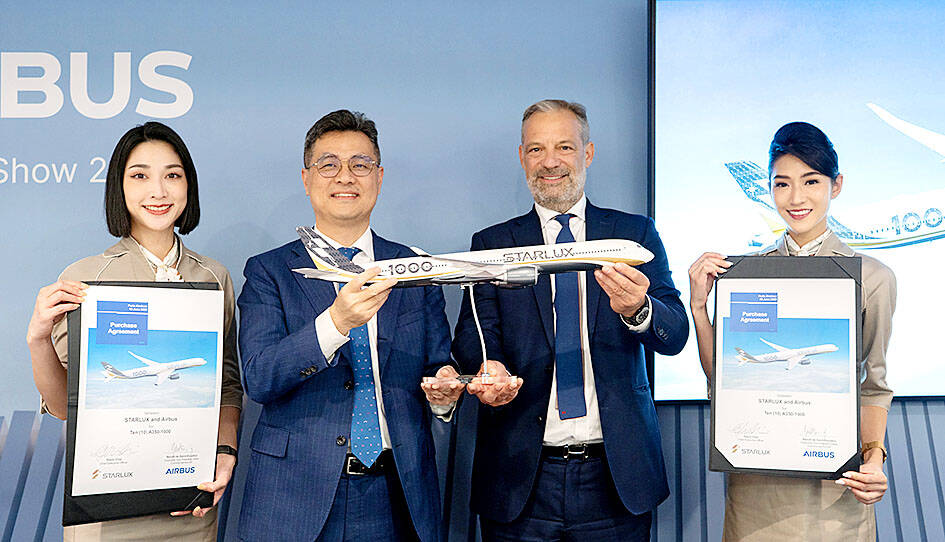Starlux Airlines Co (星宇航空) announced yesterday that it has signed an agreement to purchase an additional 10 widebody Airbus SE A350-1000s.
The order agreement was inked by Starlux chief executive officer Glenn Chai (翟健華) and Airbus executive vice president for commercial aircraft sales Benoit de Saint-Exupery on Wednesday at the Paris Air Show, Starlux said.
The airline will spend up to US$4.48 billion for the purchase with deliveries expected to start in 2031, it said.

Photo courtesy of Starlux Airlines Co
The upcoming A350-1000s will be assigned to middle to long haul services as the airline is gearing up to expand its fleet for a global network expansion, it said.
In addition, the airline will also spend up to about US$154 million to buy three spare Rolls-Royce Trent XWB-97 engines, it said.
Currently, Starlux runs an all-Airbus fleet of 28 aircraft: 10 A350-900s, five A330neos and 13 A321neos.
The airline has on order 30 aircraft including the A350F freighters and A350-1000s and it is slated to take delivery of the first A350-1000 at the end of this year.
With the latest purchase, the airline is expected to own a total of 18 A350-1000s, it said.
“Expanding our international fleet with additional A350-1000s is a significant step toward reinforcing our global presence and enhancing connectivity across key markets,” Chai said in a statement.
“As we continue to strengthen our international network, the A350-1000 will play an important role in driving growth, sustainability and operational flexibility,” Chai added.

A proposed 100 percent tariff on chip imports announced by US President Donald Trump could shift more of Taiwan’s semiconductor production overseas, a Taiwan Institute of Economic Research (TIER) researcher said yesterday. Trump’s tariff policy will accelerate the global semiconductor industry’s pace to establish roots in the US, leading to higher supply chain costs and ultimately raising prices of consumer electronics and creating uncertainty for future market demand, Arisa Liu (劉佩真) at the institute’s Taiwan Industry Economics Database said in a telephone interview. Trump’s move signals his intention to "restore the glory of the US semiconductor industry," Liu noted, saying that

On Ireland’s blustery western seaboard, researchers are gleefully flying giant kites — not for fun, but in the hope of generating renewable electricity and sparking a “revolution” in wind energy. “We use a kite to capture the wind and a generator at the bottom of it that captures the power,” said Padraic Doherty of Kitepower, the Dutch firm behind the venture. At its test site in operation since September 2023 near the small town of Bangor Erris, the team transports the vast 60-square-meter kite from a hangar across the lunar-like bogland to a generator. The kite is then attached by a

Foxconn Technology Co (鴻準精密), a metal casing supplier owned by Hon Hai Precision Industry Co (鴻海精密), yesterday announced plans to invest US$1 billion in the US over the next decade as part of its business transformation strategy. The Apple Inc supplier said in a statement that its board approved the investment on Thursday, as part of a transformation strategy focused on precision mold development, smart manufacturing, robotics and advanced automation. The strategy would have a strong emphasis on artificial intelligence (AI), the company added. The company said it aims to build a flexible, intelligent production ecosystem to boost competitiveness and sustainability. Foxconn

Leading Taiwanese bicycle brands Giant Manufacturing Co (巨大機械) and Merida Industry Co (美利達工業) on Sunday said that they have adopted measures to mitigate the impact of the tariff policies of US President Donald Trump’s administration. The US announced at the beginning of this month that it would impose a 20 percent tariff on imported goods made in Taiwan, effective on Thursday last week. The tariff would be added to other pre-existing most-favored-nation duties and industry-specific trade remedy levy, which would bring the overall tariff on Taiwan-made bicycles to between 25.5 percent and 31 percent. However, Giant did not seem too perturbed by the